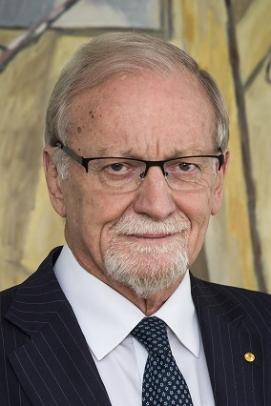Professor the Hon. Gareth Evans, AC, KC

This Award is presented to Professor the Hon. Gareth Evans – a globally acknowledged shaper of a humanistic world order – an academic, lawyer, activist, author, politician, thought leader – a man of ideals who, throughout his life, has worked to ground these ideals in reality.
From his days as a student activist he was engaged in the promotion of humanitarian issues - civil liberties issues such as “capital punishment, censorship, apartheid and abortion law reform.” And in the early days of his legal career he advised the Australian government on Indigenous land rights and legal services issues.
He entered politics as a student and was elected to the Australian Senate in 1977 as a member of the Opposition. When the government changed in 1983 he was appointed Attorney-General for Australia. And from 1988 to 1996, became Australia’s longest serving, highly-regarded and most successful Foreign Minister.
Gareth Evans has contributed to many initiatives which furthered the peace, stability and security in the world. His early contribution as Foreign Minister was the pivot of Australia to Asia – particularly to Indonesia and China - encouraging dialogue and co-operation on regional security issues and initiating a new Asia Pacific regional economic and security architecture.
Gareth’s most remarkable achievement in Asia as Foreign Minister was the ultimately successful peace plan for war-ravaged Cambodia and its multiple warring factions. His key innovation was the central role of governance of the country by the United Nations during the period of transition.
Another success – and global - was his innovative and unique action bringing together government and industry representatives from over 70 countries to involve them in the design and ultimate conclusion of a comprehensive Chemical Weapons Convention.
What brought Gareth Evans most to my attention was his initiation of the Canberra Commission on the Elimination of Nuclear Weapons. There have been other commissions - the Swedish-initiated Weapons of Mass Destruction Commission of which he was a member; and a second Australian – Japan Commission on Nuclear Non-Proliferation and Disarmament in 2008, which was also his enterprise. But the Canberra Commission remains the definitive contribution to the agenda for nuclear disarmament. Gareth continues his ardent advocacy for the elimination of nuclear weapons.
From 2000–2009 Gareth Evans was President and Chief Executive Officer of the International Crisis Group. In these ten years he expanded the scope of operations from a small number of countries, in the Balkans and Central Africa, to over sixty countries across four continents. He enlarged the staff from twenty-five to over one hundred and thirty, and increased the two million dollar budget to over fifteen million US dollars.
By the end of his tenure the International Crisis Group had become the pre-eminent international Non-Governmental Organization working on the prevention and resolution of deadly conflict, and regularly identified as one of the world's most influential think tanks.
In 2000 he was invited by Lloyd Axworthy, Canada’s Foreign Minister at that time, to co-chair the Canadian International Commission on Intervention and State Sovereignty, which, in 2001, published its ground-breaking report, The Responsibility to Protect. And Gareth Evans can take credit for naming the concept.
He has a unique ability – which I imagine is the envy of all writers - to capture the essence of an idea that illuminates the issue and becomes its signature, as does the construct, The Responsibility to Protect. In this instance, he could foresee its workability, how it would play out and be brought to fruition. He has been cited as one of the Top 100 Global Thinkers in 2011 "for making the responsibility to protect more than academic."
Gareth is universally recognized as the most significant player furthering the Responsibility to Protect Doctrine - initiating, and advocating for the international acceptance of the concept - as a member of the UN Secretary-General's High Level Panel on Threats, Challenges and Change; on the UN Secretary-General's Advisory Committee on Genocide Prevention; on the Zedillo Commission of Eminent Persons on The Role of the IAEA to 2020 and Beyond; as Co-Chair of the Advisory Board of the Global Centre on the Responsibility to Protect, and as the author of The Responsibility to Protect: Ending Mass Atrocity Crimes Once and For All, published by the Brookings Institute, and for many other published works.
It seems that whatever Gareth Evans undertakes, he opens new possibilities for the betterment of human life, for human rights, human security and for a peaceful, just world order.
Our deep gratitude goes to Gareth Evans for his contributions to a better future - for his forward-looking approach to a better world.
The Hon. Gareth Evans, A.C., K.C., is Distinguished Honorary Professor at the Australian National University, where he was Chancellor from 2010-19, Chair of the Asia-Pacific Leadership Network (APLN), President Emeritus of the International Crisis Group, and Co-chair of the International Advisory Board of the Global Centre for the Responsibility to Protect. As a recipient of The Simons Foundation Award for Distinguished Global Leadership in the Service of Peace and Disarmament, he is also one of The Simons Foundation Canada's Peace Shapers.
For more information and a complete biography, please visit www.gevans.org.
Selected articles and publications by Prof. the Hon. Gareth Evans are available below.